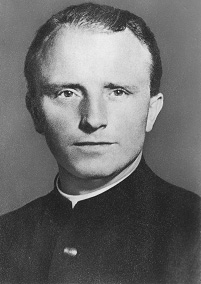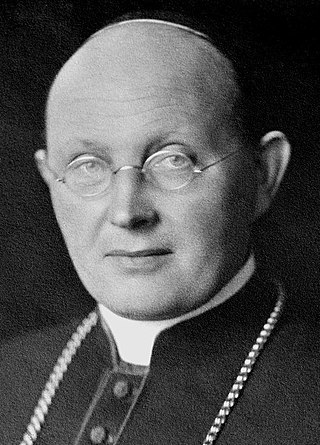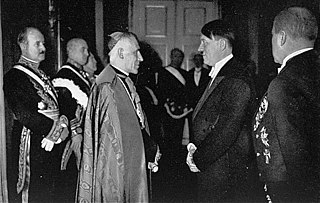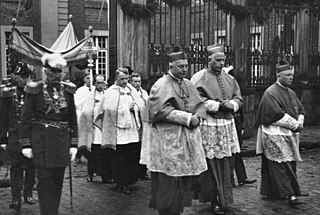The relations between the Catholic Church and the state have been constantly evolving with various forms of government, some of them controversial in retrospect. In its history, the Church has had to deal with various concepts and systems of governance, from the Roman Empire to the medieval divine right of kings, from nineteenth- and twentieth-century concepts of democracy and pluralism to the appearance of left-wing and right-wing dictatorial regimes. The Second Vatican Council's decree Dignitatis humanae stated that religious freedom is a civil right that should be recognized in constitutional law.
The Orthodox Church of the Czech Lands and Slovakia is a self-governing body of the Eastern Orthodox Church that territorially covers the countries of the Czech Republic and Slovakia. The current primate of the Czech and Slovak Orthodox Church is Rastislav of Prešov, Metropolitan of the Czech Lands and Slovakia since 2014.

Catholic clergy involvement with the Ustaše covers the role of the Croatian Catholic Church in the Independent State of Croatia (NDH), a Nazi puppet state created on the territory of Axis-occupied Yugoslavia in 1941.

The Diocese of Magdeburg is a Latin Church diocese of the Catholic Church, located in the German state of Saxony-Anhalt. Its seat is Magdeburg; it is suffragan to the Archdiocese of Paderborn.

Franz Stock was a German Roman Catholic priest. He is known for ministering to prisoners in France during World War II, and to German prisoners of war in the years following. The cause for his beatification has been accepted by the Holy See.

The Metropolitan Archdiocese of Paderborn is a Latin Church archdiocese of the Catholic Church in Germany; its seat is Paderborn. It was a diocese from its foundation in 799 until 1802, and again from 1821 until 1930. In 1930, it was promoted to an archdiocese. From 1281 until 1802, the Bishopric of Paderborn was also a state of the Holy Roman Empire.

Johannes Joachim Degenhardt was the Roman Catholic Archbishop of Paderborn (Germany) from 1974 until his death in 2002. He was named Cardinal in 2001.

Karl Joseph Schulte, was a German Cardinal of the Roman Catholic Church who served as Archbishop of Cologne from 1920 until his death, and was elevated to the cardinalate in 1921.

Paul Josef Cordes was a German cardinal of the Roman Catholic Church. He served as president of the Pontifical Council Cor Unum (1995–2010) and was elevated to the rank of cardinal in 2007.

The Prince-Bishopric of Paderborn was an ecclesiastical principality (Hochstift) of the Holy Roman Empire from 1281 to 1802.

Franz Hengsbach was a German Cardinal of the Roman Catholic Church who served as Bishop of Essen from 1957 to 1991, and was elevated to the cardinalate in 1988.
Kirchenkampf is a German term which pertains to the situation of the Christian churches in Germany during the Nazi period (1933–1945). Sometimes used ambiguously, the term may refer to one or more of the following different "church struggles":
- The internal dispute within German Protestantism between the German Christians and the Confessing Church over control of the Protestant churches;
- The tensions between the Nazi regime and the Protestant church bodies; and
- The tensions between the Nazi regime and the Catholic Church.

Catholic bishops in Nazi Germany differed in their responses to the rise of Nazi Germany, World War II, and the Holocaust during the years 1933–1945. In the 1930s, the Episcopate of the Catholic Church of Germany comprised 6 Archbishops and 19 bishops while German Catholics comprised around one third of the population of Germany served by 20,000 priests. In the lead up to the 1933 Nazi takeover, German Catholic leaders were outspoken in their criticism of Nazism. Following the Nazi takeover, the Catholic Church sought an accord with the Government, was pressured to conform, and faced persecution. The regime had flagrant disregard for the Reich concordat with the Holy See, and the episcopate had various disagreements with the Nazi government, but it never declared an official sanction of the various attempts to overthrow the Hitler regime. Ian Kershaw wrote that the churches "engaged in a bitter war of attrition with the regime, receiving the demonstrative backing of millions of churchgoers. Applause for Church leaders whenever they appeared in public, swollen attendances at events such as Corpus Christi Day processions, and packed church services were outward signs of the struggle of ... especially of the Catholic Church - against Nazi oppression". While the Church ultimately failed to protect its youth organisations and schools, it did have some successes in mobilizing public opinion to alter government policies.

Popes Pius XI (1922–1939) and Pius XII (1939–1958) led the Catholic Church during the rise and fall of Nazi Germany. Around a third of Germans were Catholic in the 1930s, most of them lived in Southern Germany; Protestants dominated the north. The Catholic Church in Germany opposed the Nazi Party, and in the 1933 elections, the proportion of Catholics who voted for the Nazi Party was lower than the national average. Nevertheless, the Catholic-aligned Centre Party voted for the Enabling Act of 1933, which gave Adolf Hitler additional domestic powers to suppress political opponents as Chancellor of Germany. President Paul Von Hindenburg continued to serve as Commander and Chief and he also continued to be responsible for the negotiation of international treaties until his death on 2 August 1934.

The Lübeck Martyrs were three Roman Catholic priests – Johannes Prassek, Eduard Müller and Hermann Lange – and the Evangelical-Lutheran pastor Karl Friedrich Stellbrink. All four were executed by beheading on 10 November 1943 less than 3 minutes apart from each other at Hamburg's Holstenglacis Prison. Eyewitnesses reported that the blood of the four clergymen literally ran together on the guillotine and on the floor. This impressed contemporaries as a symbol of the ecumenical character of the men's work and witness. That interpretation is supported by their last letters from prison, and statements they themselves made during their time of suffering, torture and imprisonment. "We are like brothers," Hermann Lange said.

Joseph M. Corrigan was a bishop of the Catholic Church in the United States. He served as the sixth rector of The Catholic University of America from 1936 to 1942.

Catholic resistance to Nazi Germany was a component of German resistance to Nazism and of Resistance during World War II. The role of the Catholic Church during the Nazi years remains a matter of much contention. From the outset of Nazi rule in 1933, issues emerged which brought the church into conflict with the regime and persecution of the church led Pope Pius XI to denounce the policies of the Nazi Government in the 1937 papal encyclical Mit brennender Sorge. His successor Pius XII faced the war years and provided intelligence to the Allies. Catholics fought on both sides in World War II and neither the Catholic nor Protestant churches as institutions were prepared to openly oppose the Nazi State.
The Roman Catholic Church suffered persecution in Nazi Germany. The Nazis claimed jurisdiction over all collective and social activity. Clergy were watched closely, and frequently denounced, arrested and sent to Nazi concentration camps. Welfare institutions were interfered with or transferred to state control. Catholic schools, press, trade unions, political parties and youth leagues were eradicated. Anti-Catholic propaganda and "morality" trials were staged. Monasteries and convents were targeted for expropriation. Prominent Catholic lay leaders were murdered, and thousands of Catholic activists were arrested.

Franz Rudolf Bornewasser was a Roman Catholic Bishop of Trier, in Germany, during the Nazi era.
Hugo Aufderbeck was a Roman Catholic theologian. He served as Bishop and Apostolic Administrator in the Episcopal Office of Erfurt-Meiningen.















